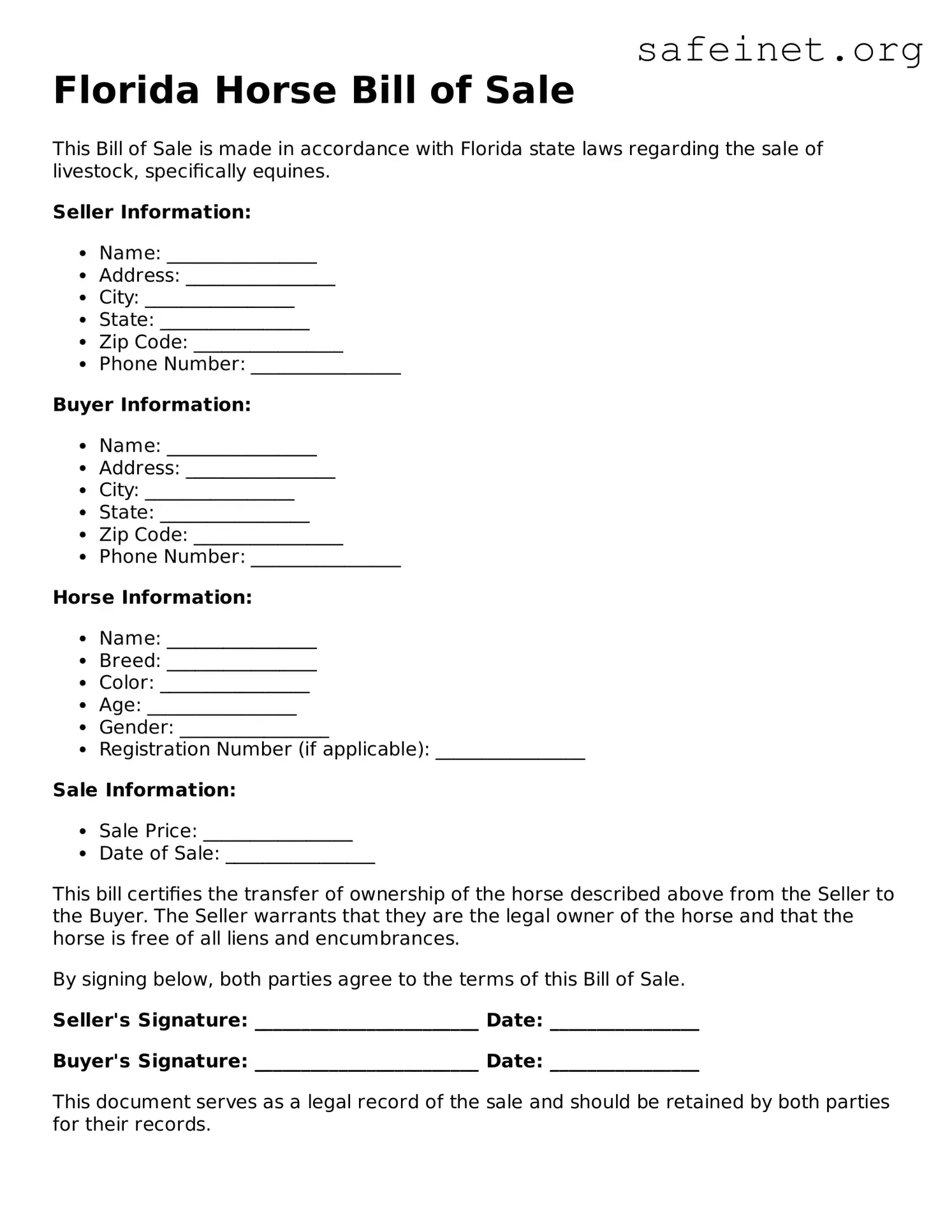What is a Florida Horse Bill of Sale form?
The Florida Horse Bill of Sale is a legal document used to record the transfer of ownership of a horse from one individual to another. This form typically includes details about the horse, such as its name, breed, age, color, and any unique identifying features. Additionally, it outlines the sales terms agreed upon by both the buyer and the seller, creating a clear record of the transaction.
Why is a Horse Bill of Sale necessary?
A Horse Bill of Sale serves several purposes. It provides proof of ownership, which may be necessary for registration with breed associations or for insurance purposes. This document protects both the buyer and the seller by outlining the terms of the sale and can help prevent disputes regarding ownership or the horse’s condition.
Is a Horse Bill of Sale required in Florida?
While a Horse Bill of Sale is not legally required in Florida, it is highly recommended. Having this document in place can safeguard both parties in the event of disagreements about the sale terms or the horse's condition. Without it, proving the transaction's details can become more complicated.
What information should be included in the Horse Bill of Sale?
Essential information includes the names and addresses of both the buyer and seller, a detailed description of the horse (including breed, age, color, and identification numbers if applicable), the sale price, and the date of the transaction. It’s also advisable to note any warranties or representations concerning the horse's health or soundness.
Can the Horse Bill of Sale be modified after signing?
Once the Horse Bill of Sale is signed by both parties, it is generally considered a binding contract. Modifications can be made, but they typically require the consent of both the buyer and the seller. It is best to document any changes in writing and have both parties sign the updated agreement to avoid potential disputes.
Are there any specific laws in Florida regarding horse sales?
Florida does not have specific laws governing horse sales. However, general contract law applies. It is important that all information on the Horse Bill of Sale is accurate, as misrepresentation can lead to legal issues. Buyers may also want to research the seller’s reputation and the horse's health history before completing a sale.
Do I need witnesses or notarization for the Horse Bill of Sale?
Witnesses or notarization are not required for a Horse Bill of Sale in Florida; however, adding witnesses or having the document notarized can provide extra validation. This can be particularly beneficial if disputes regarding the sale arise later.
What are the seller’s responsibilities after completing the sale?
Sellers should ensure that the horse is delivered as agreed in the contract. It is also advisable for the seller to provide any health records or registration papers that may accompany the horse. Maintaining professionalism and transparency during the sale process contributes to a positive transaction experience.
What should buyers do after obtaining a Horse Bill of Sale?
Once a buyer receives the Horse Bill of Sale, they should keep it in a safe place. This document serves as proof of their ownership and may be necessary for registering the horse with relevant associations or for obtaining insurance. Buyers should also confirm that all agreements stated in the bill are fulfilled.
Can the Horse Bill of Sale be used for other types of livestock?
The Horse Bill of Sale is specifically designed for the sale of horses. For other types of livestock, such as cattle or goats, a different form tailored to those species is typically required. It is crucial to utilize the appropriate documentation to ensure compliance with any specific legal requirements for different types of animals.
